- Home
- Jeff Mariotte
Witch's Canyon Page 8
Witch's Canyon Read online
Page 8
“What is it?” Sam asked, fearing the worst.
“You tell me.”
Sam shouldered in beside Dean, his right arm brushing snow from low-hanging pine branches. The bear tracks led into the clearing, plain in the fresh snow.
But then they stopped, halfway across it.
From the last tracks, it would have taken an Olympic long jumper to reach any spot outside the clearing. There were no trees close enough for the bear to have climbed up. The tracks just ended, and the bear was gone.
“Where’d he—”
“I wish I knew.”
From a branch about twenty feet up one of the nearest trees, a raven cawed. It sounded disturbingly like it was laughing at them.
“That thing must have weighed five hundred pounds,” Sam said. “It can’t just up and vanish.”
“Don’t tell me,” Dean said. “Tell it.”
The raven gave another double caw. Sam could have sworn it was looking right at them, its head cocked, a sinister grin on its bill. Then it spread its wings, pure black, like midnight shadows stretching out, and took flight. Voicing its amusement, it circled over them twice, inscribing the perimeter of the clearing. Dean raised his .45 like he might shoot it down on the wing. “Thing bothers me,” he said.
“Me, too.” The raven swept its wings against the air and flew out of sight.
“You don’t think…” Sam began.
“What? That raven was the bear? Some kind of animal shapeshifter?”
“That’s what I was thinking. The bear transformed into a bird, and that’s why the footprints stopped.”
Dean shot him a frustrated glance. “Why didn’t you say something? Maybe I should have shot it.”
“Maybe so,” Sam agreed. “I didn’t think of it until it was too late.”
“Next time, think faster.”
“I’ll try, Dean.”
“Good.”
“And Dean?”
“What?”
“What the hell are we dealing with here?”
Dean considered this for a moment. “You figure that out, college boy, you let me know.”
TWELVE
Since the mall’s food court wasn’t open yet, Sam and Dean had skipped lunch. On the way back into town, having called the sheriff’s office about the bear’s victim from the victim’s own house, Dean slowed outside the Wagon Wheel Café. Sam realized that hunger pangs had started eating his stomach from the inside out. “Sure,” he said. “I could eat. And maybe we can find something out from the locals.”
“The ones who are still alive, you mean.” Dean pulled over at the curb. “I can always eat, but I’m pretty hungry now, too.”
Inside, the Wagon Wheel carried out its theme visually, with wagon wheels printed on the menu and antique ones hung on the walls like works of art. A waitress with a knot of thick straw-blond hair on her head, an apron around her waist, and a frenzied air ticked her head toward the tables, most of which were empty. “Sit anywhere you like,” she said. “I’ll be there in a jif.”
“A jif,” Dean said as they sat down. “Don’t hear that often enough these days.”
“Place is quiet,” Sam observed.
“It’s early for dinner,” Dean said. “And it looks like it’s busy enough for her.”
Of the four occupied tables, three had what looked like families gathered around them, one of which spanned the generations from very elderly grandparents to an infant in a high chair. When Sam saw families like that, he sometimes felt a pang of regret—that was a storybook life, as far as he was concerned, something that real people did sometimes but that he could never be part of. He had hoped for a time that he might have it with Jess, even though he hadn’t grown up in that kind of setting. But it was hard to overcome one’s early life, he guessed. Kids who are homeless are more likely to become homeless as adults than kids who have always had a roof over their heads. Children in dysfunctional families often re-created them when they grew up. His chances at a “normal” family life had ended on November 2, 1983, when his mother was slaughtered against the ceiling of his nursery, and he hadn’t accepted that until Dean took him away from Stanford the weekend before his law school interview.
Since then, events had convinced him that his hopes of normalcy with Jessica would have been doomed anyway. He was simply not a normal guy. He had been chosen for something—it was no accident that Mom had died above his crib and not Dean’s bed, or her own. Sam had been targeted.
But knowing that didn’t mean it hurt any less to look at what might have been.
He noticed Dean gazing around the big room, studying the people at the tables. After a moment he realized why. “Looking for that widow? Juliet?”
“I wouldn’t mind seeing her again.”
“I bet you wouldn’t.”
Dean was about to say something else when the waitress stopped beside their table, having delivered an armload of dishes to the big family. “What can I get you? Coffee to start?”
“Sure,” Dean said. “That’d be good.”
Sam thought it over for a second. The snow was still falling outside, and there was no telling when they’d be in for the night—if at all. “Sure, coffee works.”
“Ready to order?”
Dean ordered a hamburger, Sam a hot open-faced turkey sandwich with mashed potatoes. The menu was heavy on all-American dishes and comfort foods, light on anything trendy or even remotely healthy. Sam hoped the gravy didn’t come with extra artery blockers already mixed in.
The brothers were quiet while they waited for the food, unwinding from the tension of the bear chase and the two dead bodies they’d already seen that day—three if you counted the fact that they hadn’t made it to Ralph McCaig’s place until after midnight. When the waitress came back with their orders, Dean flashed a smile at her. “You from around here?”
“Sure thing. Bred and born.”
She looked to be in her mid to late thirties, so wouldn’t remember the last murder cycle firsthand. “We’re just visiting,” Dean said. “But it sounds like we picked a bad time.”
She brushed a stray hair off her cheek. “Bad how? The snow?”
“No, I don’t mind that. But people seem to be dying around here this week.”
She moved her shoulders up and down, turning her head, like she was trying to work out a sore muscle. “I guess that’s true.”
“Have you heard about it?”
“You know how it is, place like this. People talk. I hear things. I don’t always credit what they have to say.”
“Way we hear it is, three since last night,” Dean said.
“Ralph was a good man,” the waitress said. Color flooded into her cheeks. “I didn’t really know Johnny that well. But poor Brittany Gardner—she worked here for a time, when she first moved to town.”
“Was she in her fifties or so, gray hair?” Sam asked.
“Oh, no. Brittany is—was—younger than me.”
“Then it’s four,” Sam said.
“It’s four.” The new speaker was a man sitting alone at a nearby table with a folded newspaper and a cup of coffee in front of him. He had brown hair turning gray at the temples, a big head with enormous ears that looked like they would flap in a high wind, and a somber expression. “Four, and it’s just begun.”
“Now, Cal,” the waitress said. “Don’t go filling these boys’ heads.”
Cal ignored her. His lower lip jutted out far enough for fighter jets to land on. “You can still get out of town,” he said. “If you’re just passing through, you must have someplace better you can go.” He nodded toward the waitress. “Eileen and I, we don’t know anything other than Cedar Wells. We’ll stick it out, like my family did last time, and most probably be fine. But there’s no reason for you to put yourselves at risk.”
“Well, I wasn’t born yet, if there really was a last time,” Eileen said. “But I think it’s a lot of crazy talk.”
“You just said it yourself, you wasn’t born,”
Cal said dismissively. “I was. I was fourteen. And let me tell you, it was a scary time. My pa locked us kids up in an inside bedroom and sat out on the porch with three rifles, day and night. When he had to sleep, my uncle spelled him, on account of he didn’t have a family of his own. Time betimes, they thought it was safe, and Uncle Jute went back to his place. Pa let us all out of the house. That night, Uncle Jute took an arrow through the throat. They said it killed him instantly and he didn’t suffer, but I have my doubts about that part.”
“An arrow?” Sam asked.
“That’s right. The killings happen in all sorts of ways. Guns, knives, arrows, everything.”
“What about animal attacks?”
“That, too,” Cal said.
“Cal, honestly, I don’t think—” Eileen began.
“Don’t tell me, Eileen. I was there. Forty years ago, it was, and now it’s happening again. It don’t do no good to pretend it’s not.”
“But nobody knows why?” Dean asked. “Or who’s behind it?”
“I heard the sheriffs had a suspect today,” Cal said. “Or—what did Trace call him when he was in here, Eileen?”
“A person of interest,” Eileen said.
“That’s right, a person of interest. Witnesses saw some old codger with a long gun near one of the scenes.”
“An old man?” Sam asked. “Was he dressed in a military uniform?”
“No. I heard about that, too, over at the shopping center. Jim Beckett don’t think the two are the same man. For one thing, the attacks happened too close together, timewise, but far apart in distance. Unless the old guy had a truck or something, which nobody saw, he couldn’t have got to Brittany Gardner’s place that fast.”
Sam wasn’t so sure about that. The old soldier hadn’t seemed particularly spry, but he hadn’t been particularly substantial, either. The way he phased in and out of visibility made him a spirit, most likely, and spirits weren’t bound by the same laws of physics as human beings. The only part that didn’t add up was losing the uniform and gaining a rifle.
“Boys, your food’s getting cold while you listen to Cal here,” Eileen said. “And I can tell you from personal experience that Cal can talk all night if you let him.”
Sam looked down at his plate. The gravy had started to congeal on his untouched meal. And I was so hungry.
But Cal was the first person who seemed willing to discuss the murder cycle openly, instead of pretending it wasn’t happening.
Cal regarded the Winchesters for a long moment, gave one somber nod, then drained his cup, put some bills on the table, and picked up his newspaper. “I’ll be going, then,” he said. “You boys be careful. And if you heed my advice, you’ll get yourselves gone, quicker instead of slower.”
“Thanks, Cal,” Dean said. “We’ll keep that in mind.”
Cal sauntered out of the café, Eileen watching him leave before scooping up the cash. “He means well,” she said. “He’s just a little on the excitable side.”
He didn’t look that excitable to me, Sam thought, finally digging into his dinner. Excitable like a judge, maybe.
Or an undertaker.
Cal Pohlens lived three blocks from the Wagon Wheel, with his wife Lorene and a half-blind house cat who was too mean to die, or too dumb—he hadn’t decided which. The feline was mostly Lorene’s, but since she had taken sick and spent most of her days in a wheelchair and most of her nights hooked up to a ventilator, he wasn’t sure who really took care of who. She didn’t eat much these days, so he’d taken to getting more and more of his meals at the Wheel. It helped him to get away from the house, to take some fresh air, and to see other people now and again.
He was halfway home when something caught his eye.
A dark shape had passed just beyond the half-circle glow thrown by a motion light above the Richardsons’ door. The motion had been furtive, like someone, or something, ducking into the shadows before he or it could be seen. Cal slipped a hand into the pocket of his Carhartt barn coat and gripped the .38 revolver he carried there. He took a few steps forward, until he could see into the shadows at the side of the Richardson house.
The figure was still on the move. This time it passed through a stray slice of moonlight cutting through the trees of the property next door, and he saw an old man in a heavy coat and a hunting cap, the kind with flaps that tied up on top or could be let down over your ears. He carried a rifle at port arms. When he saw Cal looking at him, he darted from the light, vanishing into the black shadows behind the Richardsons’ place.
“You there!” Cal shouted. “Come back here!”
The old man didn’t answer. Any other time, any other year, Cal might have thought he had imagined it, or he might rightly have believed that he’d had one too many at the Plugged Bucket. But he hadn’t had a drink since the first of December. He wanted his hands steady and his mind sharp. Leaving Lorene alone except for that damn cat wasn’t the best idea, maybe, but he needed some time to himself, and he needed to eat. Most hours of the day and night he was right there with her, and anything that wanted to kill her would have to face him first.
In his other coat pocket, Cal had a cell phone. He drew out both hands at once, .38 in his right, phone in his left, and started down the Richardsons’ driveway. With his left hand he flipped the phone open and punched 911, and in a moment Susannah Brighton, the night dispatcher, answered.
“It’s Cal Pohlens, Susannah,” he said. “I’m outside Lew and Billie Richardsons’ place on School, and I just saw some old bastard with a rifle sneaking around the back.”
“An old man?” Susannah asked.
“Twice my age if he’s a day,” Cal replied. “I’m surprised he don’t need a walker, but he can move pretty good.”
“I’ll dispatch some officers right away, Cal,” she said. “You just stay back and point them in the right direction when they get there. And be careful.”
“Yes’m,” he said, and ended his call. He dropped the phone back into his pocket but kept the pistol out. “Screw that,” he mumbled to himself. Lew Richardson wasn’t exactly his friend—man had borrowed a chain saw ten years ago, and gave it back two years later with the chain about rusted through and the engine fouled. But Lew was a neighbor, and he’d be damned if he would just stand around with his thumb up his ass while the old man killed Lew and Billie.
Alert for anything, finger resting lightly on the trigger, Cal headed down the driveway. He kept his tread soft, checking the ground every couple of steps to make sure he didn’t step on anything that might make noise. If he did, the snow quieted it.
When he reached the back corner of the house, he squeezed in close to the wall and came around slowly. The old man was still back there, about ten feet from the kitchen door, hunkered down behind a bush just out of the light that spilled from the windows. He studied the house something fierce, and that old gun—was it an old Henry rifle?—was pointed right at it.
Cal didn’t want the guy to get off a shot at Billie or Lew. He showed himself, leveling his .38 at the man’s torso. “Drop that antique and come out of there,” he demanded. “Right now, before I lose patience and just shoot—”
His command was interrupted by the kitchen door swinging open with a bang and a shape launching out of it. Cal tore his gaze from the old man and caught the briefest glimpse of someone who looked like a rancher—not a modern rancher, but one from a century past, wearing cotton dungarees and a plaid shirt and plain, heavy boots, carrying a big bowie-type knife—just before the man slammed into him and bulled him to the ground. Cal heard two shots ring out, one his own, which went wild, and one that must have been from the old guy with the Henry rifle. That one struck the rancher—Cal saw the impact as the bullet hit him in the temple and saw his head swing from the force, saw tissue and bone fly from an exit wound on the other side.
What it didn’t do was stop him or seem to slow him down at all. The rancher landed astride Cal, and he took the thick-bladed, heavy bowie, grabbed Cal’s ha
ir with his left hand, and commenced sawing at Cal’s scalp. Cal screamed and screamed, thought maybe he heard one more shot, thought maybe he saw a puff of dust from a bullet that might have passed through the rancher’s plaid shirt, but he couldn’t be sure about any of that because his own screams drowned everything out and his own blood was splashing into his eyes.
A third shot sounded, and this time Cal was pretty sure he heard it. Blinking away the stinging blood, he saw the old man, not six feet from the guy who was scalping him alive. The rancher’s face showed pain this time, his mouth dropping open, his head tilting toward Cal. For the first time, Cal saw that the rancher had lost his own scalp; the top of his head was shorn down to the bone in spots, although no blood showed there.
The rancher slumped forward, sliding off Cal and falling to the ground beside him. Cal tried to move, to gain his feet, to run away or shoot or do anything, but he was too weak. Cold and weak. Lying in the snow, the scalped rancher just inches away, he watched the man blink in and out like a flashlight with a drained battery. He was there and then he wasn’t and then he was, and then he was gone. Cal didn’t think he was coming back, but by then everything had grown dark, so he wasn’t at all sure.
THIRTEEN
A siren pierced the quiet of Main Street.
“Let’s go,” Sam said.
Dean threw money on the table. Eileen caught his gaze as he shrugged into his coat. “Thanks, guys,” she called.
“Food was great,” Sam assured her. He had eaten about half his dinner, Dean guessed. Dean had wolfed down a little more, but he’d been eating as Cal was talking, while Sam had been listening.
They rushed outside, ran for the car. Dean got his door open while Sam was still running around to the passenger side, and he had the engine roaring by the time Sam sat down. Checking the rearview, he lurched out into the road. Sam was thrown back into the seat, still wrestling with the seat belt.

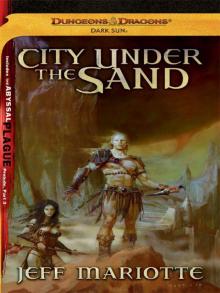 City Under the Sand
City Under the Sand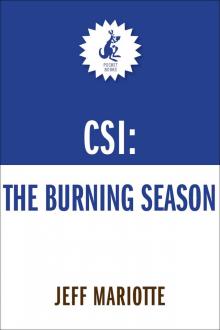 The Burning Season
The Burning Season Sanctuary
Sanctuary Winds of the Wild Sea
Winds of the Wild Sea Serpents in the Garden
Serpents in the Garden Close to the Ground
Close to the Ground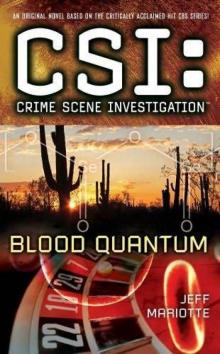 Blood Quantum
Blood Quantum Brass in Pocket
Brass in Pocket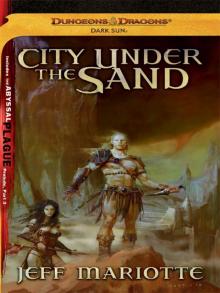 City Under the Sand: A Dark Sun Novel (Dungeons & Dragons: Dark Sun)
City Under the Sand: A Dark Sun Novel (Dungeons & Dragons: Dark Sun)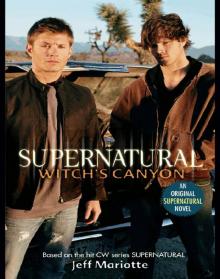 Witch's Canyon
Witch's Canyon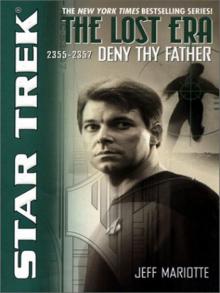 STAR TREK: The Lost Era - 2355-2357 - Deny Thy Father
STAR TREK: The Lost Era - 2355-2357 - Deny Thy Father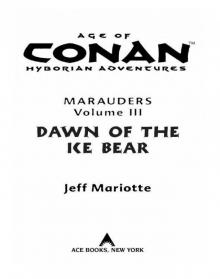 Dawn of the Ice Bear
Dawn of the Ice Bear The Xander Years, Vol.2
The Xander Years, Vol.2 Ghost of the Wall
Ghost of the Wall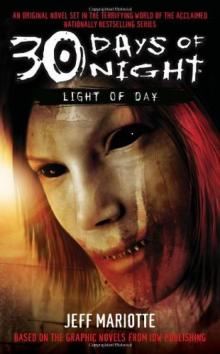 30 Days of Night: Light of Day
30 Days of Night: Light of Day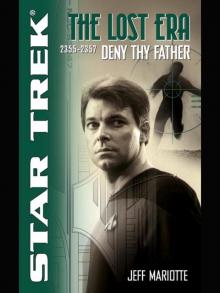 Deny Thy Father
Deny Thy Father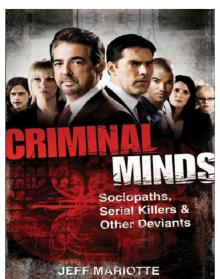 Criminal Minds
Criminal Minds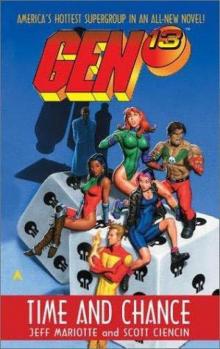 Time and Chance
Time and Chance The Folded World
The Folded World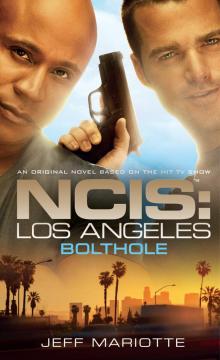 Bolthole
Bolthole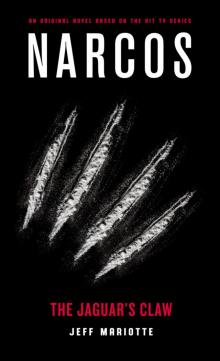 Narcos
Narcos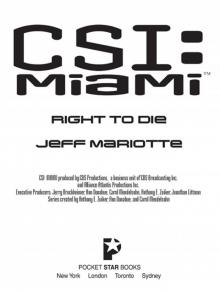 Right to Die
Right to Die